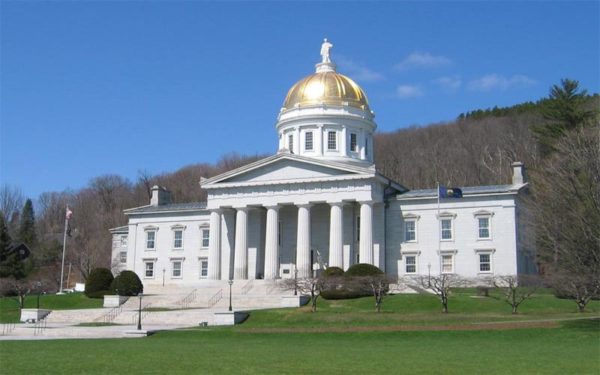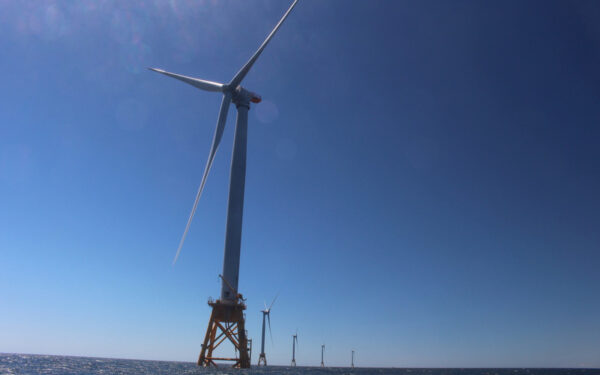UPDATE: Vermont and Rhode Island recently joined Massachusetts, Connecticut, and Maine in putting a strong, enforceable climate law on the books. Vermont has now formed a climate council, which will meet to discuss the best ways of combatting the climate crisis in the Green Mountain State. Rhode Island’s climate law will put the state on track to lowering its climate-damaging emissions and help Rhode Islanders benefit from the transition to a clean energy economy.
Maine has also used its climate law to push forward with action. This month, the Maine Climate Council released its Climate Action Plan, which offers expert recommendations for how the state can effectively lower emissions, build resilient communities, and combat climate change.
Massachusetts has also updated its Global Warming Solutions Act with the Next Generation Roadmap Law. This critical update adds important justice language to the original bill, and ensure Massachusetts follows the latest science when crafting its plans to lower emissions.
We’re facing a climate crisis. There’s still time to act, but we need to start now. We must slash carbon pollution and transform our economy to run on clean, renewable energy.
How can we get it done? With strong, enforceable climate laws in every new England state.
What Does a Climate Law Do?
A climate law mandates that your state cut its climate-damaging emissions to zero no later than 2050. The strongest laws also have interim targets to ensure we reach this mark – cutting our emissions at least in half by 2030 – and require that states develop a roadmap to get there.
That way, we’ll be smart about the path we take to ditch fossil fuels and switch to home-grown clean energy, all while sustaining a robust economy.
Critically, with these laws, the zero by 2050 mark is not just a goal that can be ignored by politicians. It’s an enforceable limit.
Why Do We Need Climate Laws?
Scientists say we can still avoid the worst impacts of climate change if we reach net-zero carbon pollution before 2050. We need these laws to hit that mark. Just having vague goals on the books hasn’t worked.
But some lawmakers refuse to act. They’d risk climate catastrophe and let the rest of us deal with the fallout. We’re already experiencing climate change’s effects in the form of deadly heatwaves, increasing tick populations, and more severe storms. And these effects are disproportionately felt by low-income, immigrant, and communities of color – intersecting with other forms of injustice and oppression. We cannot continue to make our most vulnerable communities sacrifice zones even as climate impacts worsen.
That’s why we must demand strong climate laws now. There’s no time left to wait.
What Do Climate Laws Look Like in New England?
So far, Massachusetts, Connecticut, and Maine all have binding climate laws on the books. Massachusetts and Connecticut passed their laws, called Global Warming Solutions Acts, in 2008. (CLF is now looking to update Massachusetts’ law according to the latest science, and with requirements to create a robust roadmap to reach its 2050 goal.)
Maine passed its law early in 2019 and is now collecting expert recommendations for its climate council – the group that will direct the State’s ultimate plan to slash emissions.
The Vermont legislature is considering its own Global Warming Solutions Act now, looking at the link between public health and climate. It’s particularly pressing as the state looks towards recovering from the COVID-19 pandemic.
And in Rhode Island, while bills have been introduced, the legislature has yet to turn its paper pledges into real action. The Ocean State still does not have a binding climate law. We plan to change that soon.
New Hampshire, meanwhile, lags behind its neighbors. It, too, has goals to cut emissions, but progress in making those goals enforceable has been lacking. (That’s not going to stop us from trying, however.)
How Can I Help?
We only have a few years to slash climate-damaging emissions or face the most devastating effects of climate change. CLF is determined to put a climate law on the books in every New England state.
If your state isn’t making progress on climate, contact your representative and demand they take action. It will take all of us working together to avoid the worst impacts of climate devastation and secure a healthy New England for everyone.
A version of this blog was previously published on July 3, 2020.




